in Thoreau’s Journal:
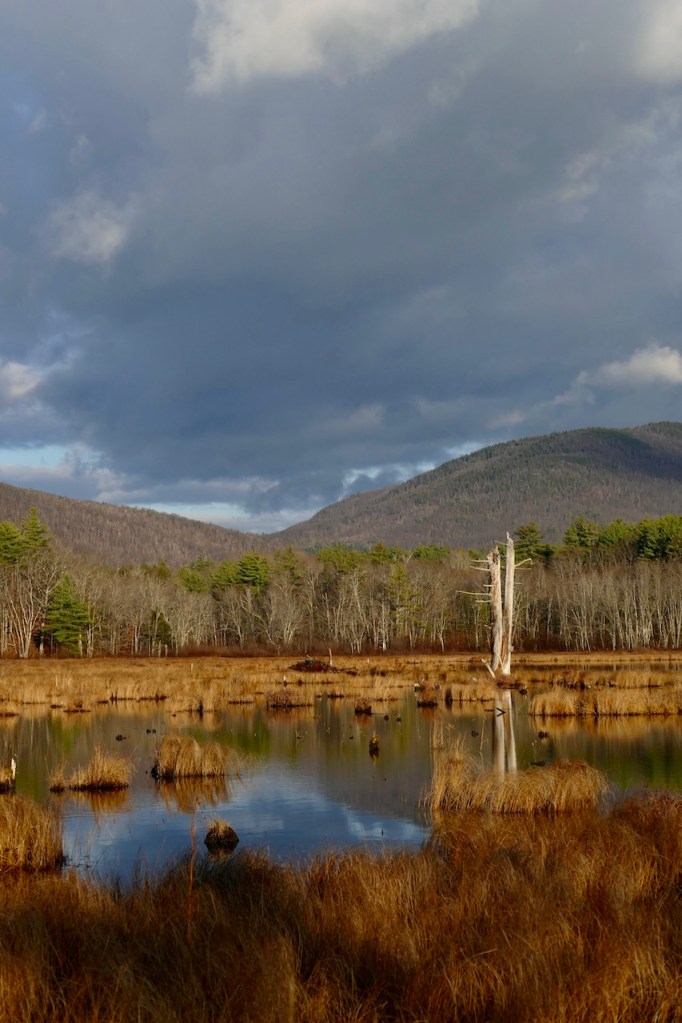
Is not this already November when the yellow & scarlet tints are gone from the forest?

in Thoreau’s Journal:
The white birches being now generally bare, they stand along the east side of Heywood’s meadow slender, parallel white stems, revealed in a pretty reddish maze produced by their fine branches. It is a lesser and denser smoke (?) than the maple one. The branches must be thick, like those of maples and birches, to give the effect of smoke, and most trees have fewer and coarser branches, or do not grow in such dense masses.
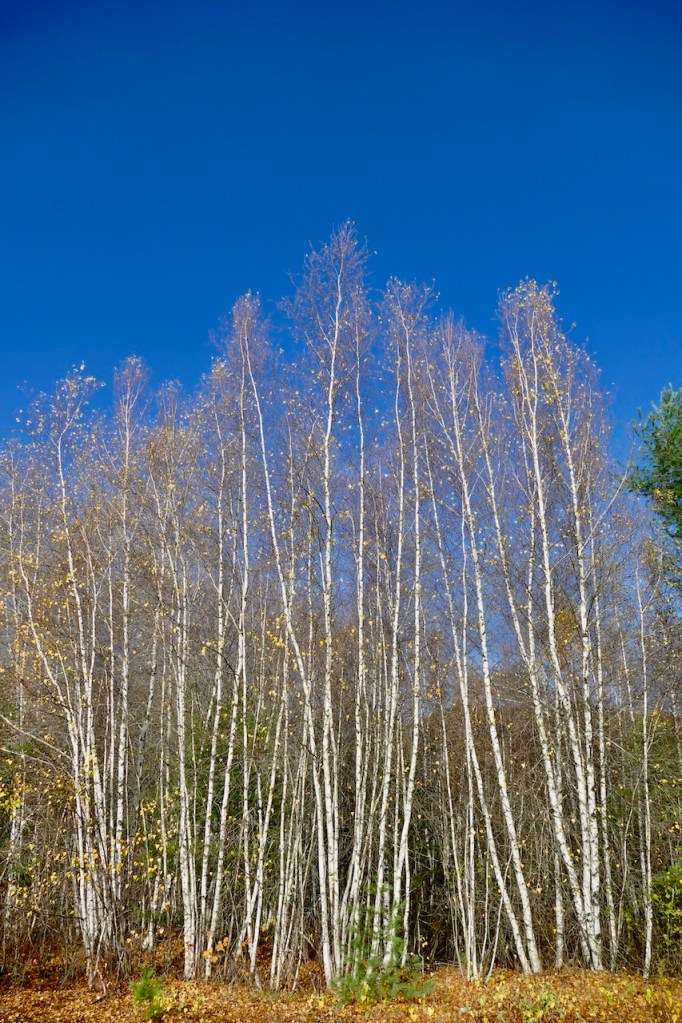
Nature now, like an athlete, begins to strip herself in earnest for her contest with her great antagonist Winter. In the bare trees and twigs what a display of muscle!
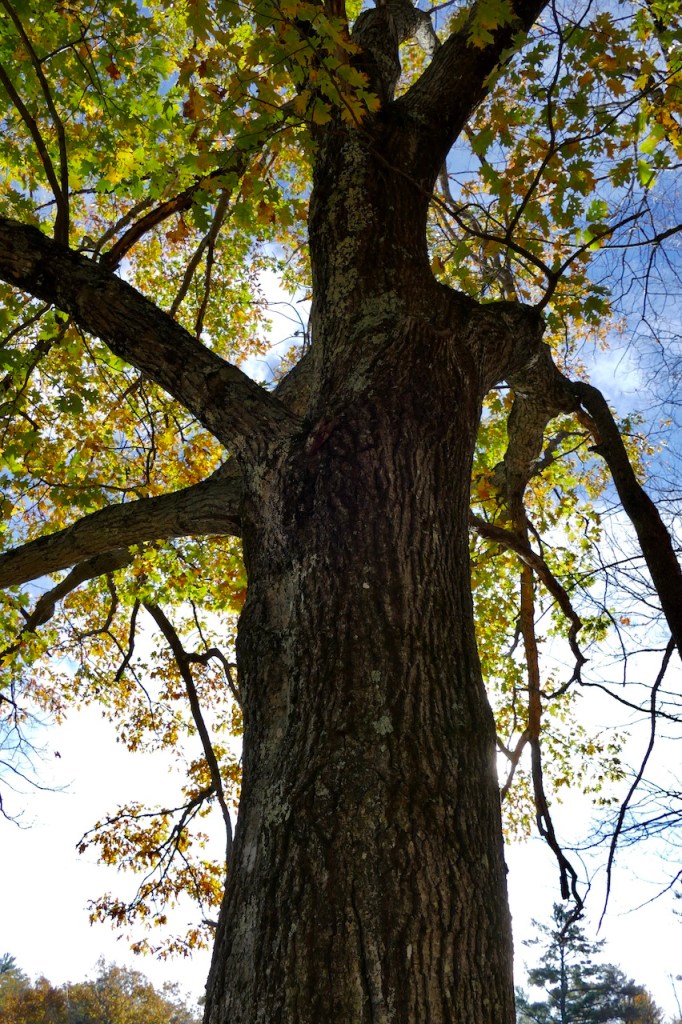
in Thoreau’s Journal:

Tell me precisely the value and significance of these transient gleams which come sometimes at the end of the day, before the close of the storm, final dispersion of the clouds, too late to be of any service to the works of man for the day, and notwithstanding the whole night after may be overcast! Is not this a language to be heard and understood? There is, in the brown and gray earth and rocks, and the withered leaves and bare twigs at this season, a purity more correspondent to the light itself than summer offers.
in Thoreau’s Journal:
Everything beautiful impresses us as sufficient to itself. Many men who have had much intercourse with the world, and not borne the trial well, affect me as all resistance, all burr and rind, without any gentle man or tender and innocent core left.
It is surprising how any reminiscence of a different season of the year affects us. When I meet with any such in my journal, it affects me as poetry, and I appreciate that other season and that particular phenomenon more than at the time. The world so seen is all one spring, and full of beauty. You only need to make a faithful record of an average summer day’s experience and mood, and read it in the winter, and it will carry you back to more than that summer day alone could show. Only the rarest flower, the purest melody of the season, thus comes down to us.

When, after feeling dissatisfied with my life, I aspire to something better, and more scrupulous, more reserved and continent, as if expecting somewhat, suddenly I find myself full of life as a nut of meat, –– am overflowing with a quiet, genial mirthfulness. I think to myself, I must attend to my diet. I must get up earlier and take a morning walk. I must have done with business, and devote myself to my muse. So I damn up my stream, and my waters gather to a head. I am freighted with thought.
[Photo: Although October, the world seen as all one spring, and full of beauty.]
in Thoreau’s Journal:
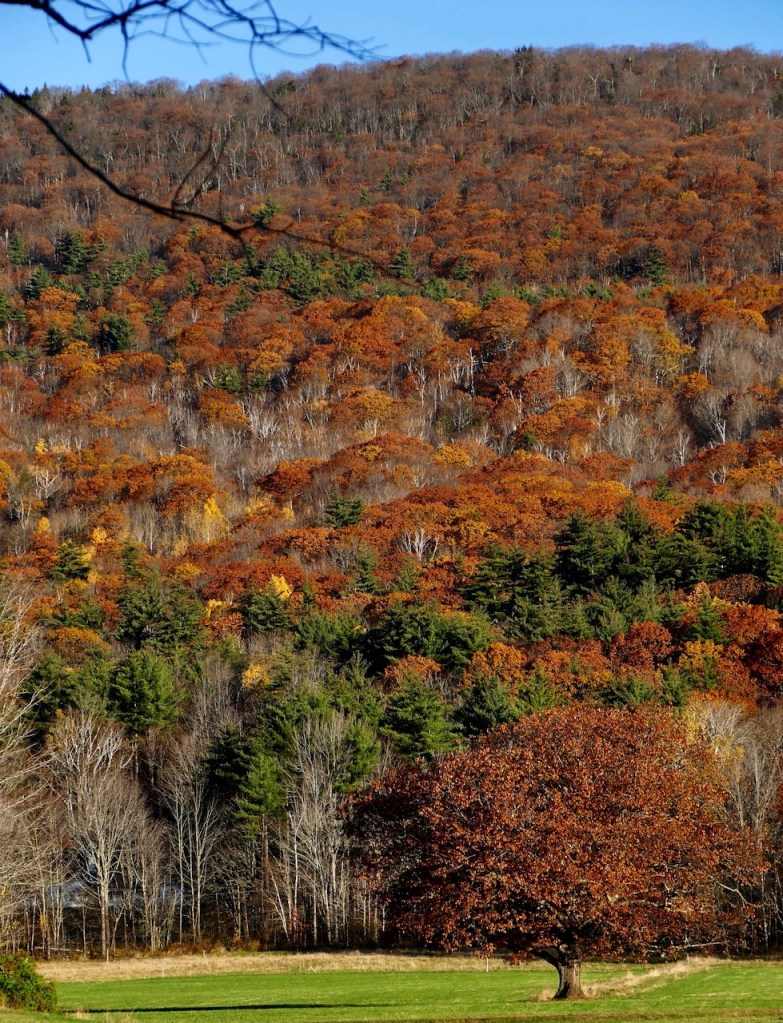
The autumnal tints grow gradually darker & duller— They are doing to a crisp. But not less rich to my eye — And now a hill side near the river exhibits the darkest crispy reds and browns of every hue all agreeably blended— At the foot next the meadow stands a front rank of smoke like maples bare of leaves—intermixed with yellow birches. Higher up red oaks of various shades of dull red—with yellowish perhaps black oaks intermixed—and walnuts now brown—& near the hill top or rising above the rest perhaps a still yellowed oak—& here and there amid the rest or in the fore ground on the meadow—dull ashy salmon-colored white oaks large & small—all these contrasting with the clear liquid sempiternal green of pines.
in Thoreau’s Journal:
The brilliant autumnal colors are red and yellow and the various tints, hues, and shades of these. Blue is reserved to be the color of the sky, but yellow and red are the colors of the earth flower. Every fruit, on ripening, and just before its fall, acquires a bright tint. So do the leaves; so the sky before the end of the day, and the year near its setting. October is the red sunset sky, November the later twilight. Color stands for all ripeness and success.

in Thoreau’s Journal:

/The milk weed (Syriaca) now rapidly discounting. The lanceolate pods having opened the seeds spring out on the least jar or when dried by the sun—& form a little fluctuating white silky mass or tuft each held by the extremities of the fine threads, until a stronger puff of wind sets them free. It is a pleasant sight to see it dispersing its seeds…

in Thoreau’s Journal:
Think how much the eyes of painters—both artisans & artists—& of the manufacturer of cloth & paper—& the paper stainers—&c are to be educated by these autumnal colors. The stationer’s envelopes may be of very various tints—yet not so various as those of the leaves of a simple tree sometimes—If you want a different shade or tint of a particular color you have only to look further within or without the tree—or the wood. The eye might thus be taught to distinguish color & appreciate a difference of shade or tint.

in Thoreau’s Journal:
This is a remarkable feature in the landscape now—the abundance of dead weeds. The frosts have done it. Winter comes on gradually. The red maples have lost their leaves before the rock maple which is now loosing its leaves at top first. All the country over the frosts have come & sered the tenderer herbs along all brook sides— How unobserved this change until it has taken place.

in Thoreau’s Journal:
It is a very singular & agreeable surprise to come upon this conspicuous & handsome—& withal flower [fringed gentian] at this season when flowers have passed out of our minds & memories—the latest of all to begin to bloom unless it be the Witch hazel—

When, excepting the latter, flowers are reduced to that small Spartan cohort—hardy, but for the most part unobserved, which linger till the snow buries them—& those interesting re-appearing flowers which though fair & fresh & tender hardly delude us with the prospect of a new spring—& which we pass by indifferent as if they only bloomed to die.
in Thoreau’s Journal:
Why flee so soon to the theatres, lectures-rooms, and museums of the city? If you will stay here a while, I will promise you strange sights. You shall walk on water.

All these brooks and rivers and ponds shall be your highway. You shall see the whole earth covered a foot or more deep with purest white crystals in which you slump or over which you glide, and all the trees and stubble glittering in icy armor.
in Thoreau’s Journal:
—To WaldenWoods
The trees which with us grow in masses, i. e. not merely scattering, are: —
1, 2. White and pitch pine
3. Oaks
4. White Birch

5. Red maple
6. Chestnut
7. Hickory
Alder
Hemlock, spruce, and larch
Cedar (white and red)
Willow
Locust
Apple
Red cherry (in neighboring towns) W.
Sugar maple (rare)
in Thoreau’s Journal:
I think that the principal stages in the autumnal changes of trees are these, thus far, as I remember, this year: ––
First, there were in September the few prematurely blushing white maples, or blazing red ones in water, that reminded us of October. Next, the red maple swamps blazed out in all their glory, attracting the eyes of all travellers and contrasting with other trees. And hard upon these came the ash trees and yellowing birches, and walnuts, and elms, and the sprout-land oaks, the last streaking the hillsides far off, often occupying more commanding positions than the maples. All these add their fires to those of the maples. But even yet the summer is unconquered. Now the red maple fires are gone out (very few exceptions), and the brightness of those accompanying fires is dulled, their leaves falling; but a general, though duller, fire, yellowish or red, growing more reddish, has seized the masses of the forest, and betrays the paucity of the evergreens, but mingled with it are the delicate tints of aspens, etc., and, beneath, of protected underwoods whose exposed specimens gave us such promise.
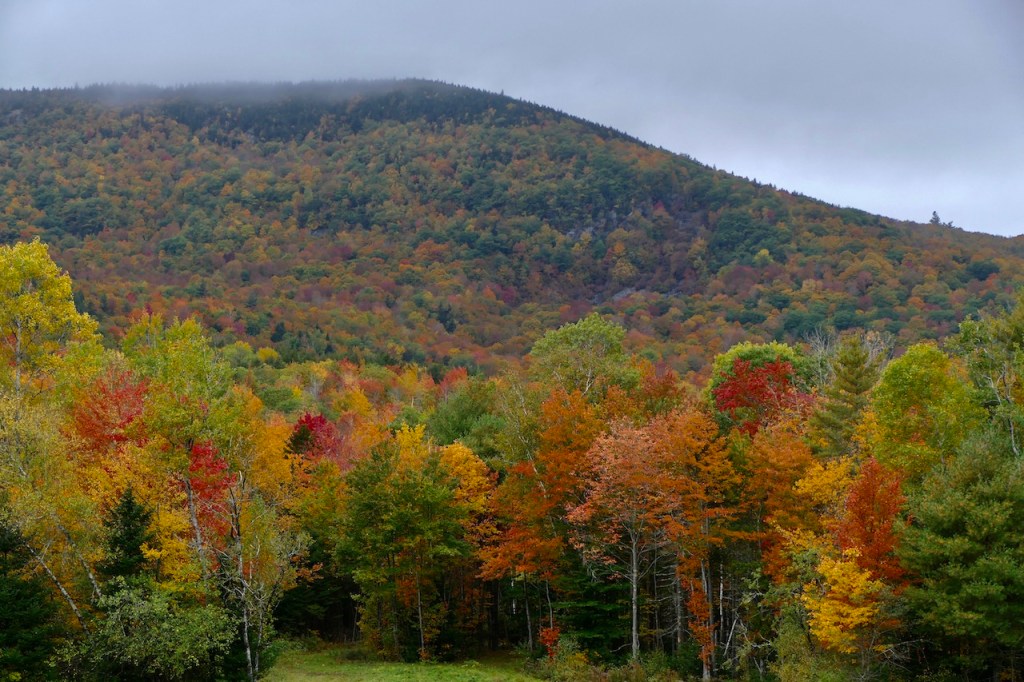
in Thoreau’s Journal:
Each town should have a park, or rather a primitive forest, of five hundred or a thousand acres, where a stick should never be cut for fuel, a common possession forever, for instruction and recreation. We hear of cow-commons and ministerial lots, but we want men-commons and lay lots, inalienable forever. Let us keep the New World new, preserve all the advantages of living in the country. There is meadow and pasture and wood-lot for the town’s poor. Why not a forest and huckleberry-field for the town’s rich? All Walden Wood might have been preserved for our park forever, with Walden in its midst, and the Easterbrooks Country, an unoccupied area of some four square miles, might have been our huckleberry-field. If any owners of these tracts are about to leave the world without natural heirs who need or deserve to be specially remembered, they will do wisely to abandon their possession to all, and not will them to some individual who perhaps has enough already. As some give to Harvard College or another institution, why might not another give a forest or huckleberry-field to Concord? A town is an institution which deserves to be remembered. We boast of our system of education, but why stop at schoolmasters and schoolhouses? We are all schoolmasters, and our schoolhouse is the universe. To attend chiefly to the desk or schoolhouse while we neglect the scenery in which it is placed is absurd. If we do not look out we shall find our fine schoolhouse standing in a cow-yard at last.
in Thoreau’s Journal:
To White Pond. Another, the tenth or eleventh of these memorable days. I am glad to reach the shade of Hubbard’s Grove. The coolness is refreshing. It is indeed a golden autumn….Let your capital be simplicity and contentment…..
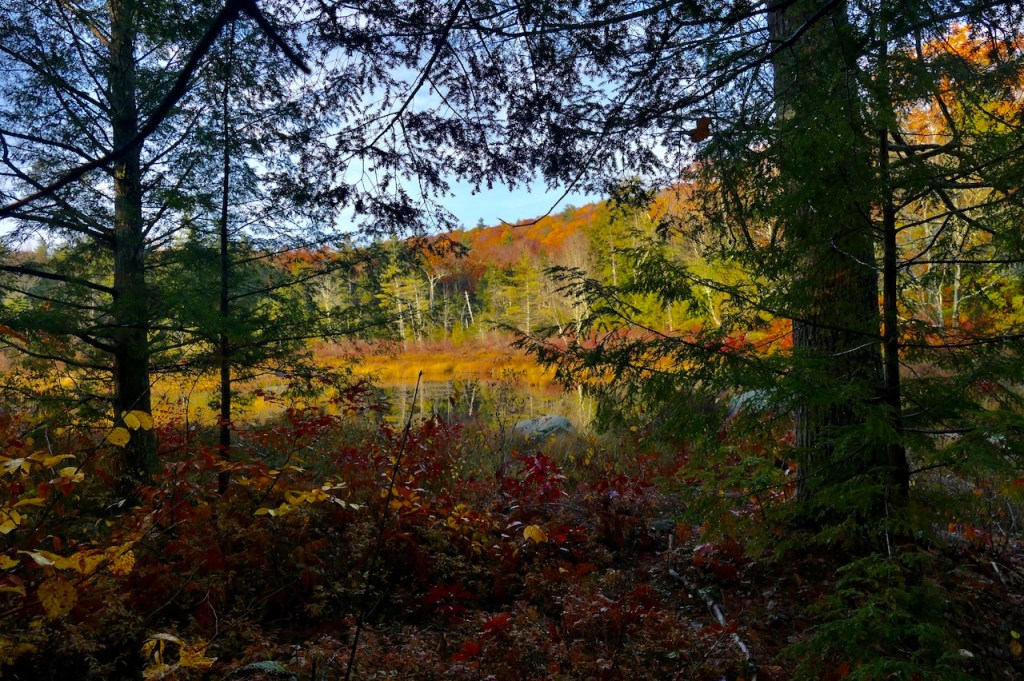
I take all these walks to every point of the compass, and it is always harvest-time with me. I am always gathering my crop from these woods and fields and waters, and no man is in my way or interferes with me. My crop is not their crop. To-day I see them gathering in their beans and corn, and they are a spectacle to me, but are soon out of my sight. I am not gathering beans and corn. Do they think there are no fruits but such as these? I am a reaper; I am not a gleaner. I go reaping, cutting as broad a swath as I can, and bundling and stacking up and carrying it off from field to field, and no man knows nor cares. My crop is not sorghum nor Davis seedlings. There are other crops than these, whose seed is not distributed by the Patent Office. I go abroad over the land each day to get the best I can find, and that is never carted off even to the last day of November, and I do not go as a gleaner.
You must be logged in to post a comment.